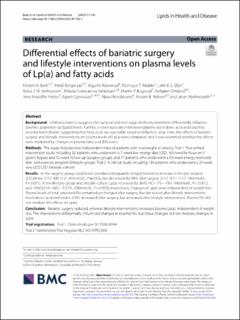Differential effects of bariatric surgery and lifestyle interventions on plasma levels of Lp(a) and fatty acids
Berk, Kirsten A.; Borgeraas, Heidi; Narverud, Ingunn; Mulder, Monique T.; Øyri, Linn Kristin Lie; Verhoeven, Adrie J M; Småstuen, Milada Cvancarova; Bogsrud, Martin Prøven; Omland, Torbjørn; Hertel, Jens Kristoffer; Gjevestad, Espen Svendsen; Nordstrand, Njord; Holven, Kirsten Bjørklund; Hjelmesæth, Jøran Sture
Peer reviewed, Journal article
Published version
Permanent lenke
https://hdl.handle.net/11250/3042246Utgivelsesdato
2022Metadata
Vis full innførselSamlinger
Sammendrag
Background: Limited evidence suggests that surgical and non-surgical obesity treatment diferentially infuence plasma Lipoprotein (a) [Lp(a)] levels. Further, a novel association between plasma arachidonic acid and Lp(a) has recently been shown, suggesting that fatty acids are a possible target to infuence Lp(a). Here, the efects of bariatric surgery and lifestyle interventions on plasma levels of Lp(a) were compared, and it was examined whether the efects were mediated by changes in plasma fatty acid (FA) levels. Methods: The study includes two independent trials of patients with overweight or obesity. Trial 1: Two-armed intervention study including 82 patients who underwent a 7-week low energy diet (LED), followed by Roux-en-Y gastric bypass and 52-week follow-up (surgery-group), and 77 patients who underwent a 59-week energy restricted diet- and exercise-program (lifestyle-group). Trial 2: A clinical study including 134 patients who underwent a 20-week very-LED/LED (lifestyle-cohort). Results: In the surgery-group, Lp(a) levels [median (interquartile range)] tended to increase in the pre-surgical LED-phase [17(7–68)-21(7–81)nmol/L, P=0.05], but decreased by 48% after surgery [21(7–81)—11(7–56)nmol/L, P

